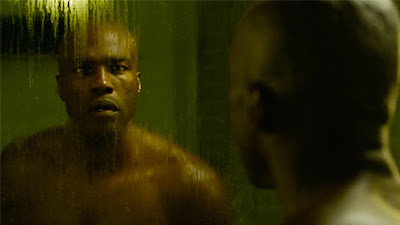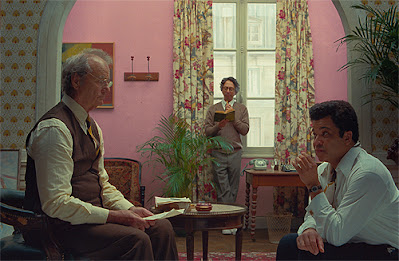THE MATRIX RESURRECTIONS (2021)
The Matrix was a film that came out in 1999. A film that borrowed liberally from the Eastern kicks of Hong Kong cinema, as well as the cyberpunk aesthetics of Japanese animation. An almost perfect distillation of various influences that changed Hollywood action movies, and the career of a certain leading man. But it was one film. The one, if you like. Two sequels, some video-games and several comic books later, and it remains a stand-alone movie in many respects. The sequels had no lasting impact after the 'Year of The Matrix.' There were no real repercussions as a result of that swamp of multimedia projects. In some ways the sequels drained any impetus the whole thing had. The same is still very much true today.
What is The Matrix? It's something that comes up in the film itself, in a cheeky metaphysical sense. As well as a nod to the viral marketing from the turn of the Millennium. The story this time around sees Neo (Keanu Reeves) trapped once again in a digital world. Only this time his prior adventures have been re-contextualised as a video-game he created. Any ideas he might have about this being a real experience are treated with therapy and prescription drugs. It's up to his work colleagues to decide what The Matrix is all about, in order to make a new instalment. But in an ironic twist the real world film makers involved have also lost sight of what made the original movie any good. The results, to be frank, are a mess in more ways than one.
In a nuts and bolts sense the original trilogy was just a series of action films. Part two had a handful memorable moments despite all the dry monologues and philosophical posturing. Part three somehow had less to write home about, even as action schlock. But thanks to Yuen Woo-Ping there was always some consistency. However, in this case there are no mind blowing sequences. There aren't even any fun ones. The action is shot in a strangely sloppy way and the set pieces are dull. How could such a key ingredient be left out like this? But there are a lot of things missing for some reason or another, and it never grows into anything new. Or anything worth seeing, even out of morbid curiosity.
Consistency itself is entirely absent. Is this another story about breaking free of authoritarian control and freeing your mind? It's never clear about these themes. Is it a romance about Neo and Trinity being reborn? They're never on screen long enough. New characters come and go just to be forgotten as things progress. If it was meant to be a pastiche or a commentary on franchises, then even these ideas are dropped in the first act. If it was meant to be a visit to the machine city from the prior sequels, then it's never explored. The first act feels like a sitcom or a webseries. While the second is a return to the mind-numbing real world talk of Reloaded. When Trinity (Carrie-Anne Moss) finally comes back it's too late to save the narrative.
It's hard to see this satisfying fans of the central duo. It's not really their story for long stretches and they need a lot more charisma. It's never about control, or religion, or technology. It's not even a simple hero's origin for the new faces. Structurally it's all over the place, which is crazy when the film-making was originally so incredibly good. It doesn't even have a new pulse pounding score by Don Davis. Instead there's a lot of poorly acted expository scenes that lack energy or intrigue. It's never crafted well enough to be a satisfying mystery plot or an edge of your seat thriller. New and old characters are certainly here, but attempts at including clever twists on characters like Morpheus and Agent Smith come off as a joke.
Is this all a joke? Perhaps it is. Some of the actors seem to think they're in a comedy. This whole thing might be amusing if it all wasn't so tedious. The actual reasons for Neo and Trinity being alive are never interesting. There's no rebellious energy. The newest iteration of The Matrix simulation itself is never compelling. Changes, when they're even shown, are just baffling. There are new takes on things like enemy agents, blue pills, and magic mirrors. But there's nothing that feels like the result of a passion project. Or even a project that was undertaken with care and attention. After so long shouldn't this be perfectly pitched, and perfectly realised? Maybe it's meant to be a trashy money spinner. But the future sequel bait is too blatant.
Overall a lot of questions like this remain. Is this a good 'Matrix' movie? No. Does this even work as a movie at all? It's debatable. Why was this made? Who can say. Maybe the disparate elements are left over from a failed TV series idea, that was slapped together at the last minute. Those who actively enjoy the original films as a real trilogy are going to be left wondering how this fits in. The style, the tone, and the contents certainly don't. Perhaps they'll have to do some mind-bending mental gymnastics of their own. At its best this is just another fraudulent part four in a long dormant series, like so many others. At its worst its just a huge waste of time. The Matrix was a great one-off movie from 1999. It still is.
1/5
BONUS REVIEW
THE FRENCH DISPATCH (2021)
Meanwhile Wes Anderson's latest is another exercise in pure mechanism. It might annoy you but the deliberate style is at least incredibly meticulous. You can feel the theatrical trappings fitting together and the cogs turning. An actual stage production features in one sequence. Here the influences seem to be Fritz Lang and Jaques Tati as the story flips between the subject matters of the titular magazine. It's an American publication being written about France, so of course the contents are sex, revolution, art, and cooking. At times the distinct chapters can feel disparate but they're all fairly interesting. And of course there's an enormous ensemble who fit together well, in the usual doll's house fashion.
It's a who's-who of Anderson regulars, as well as a surprisingly large number of faces from the recent James Bond franchise. Did everyone in No Time To Die try and get into the cast, and are those not here bitter about missing out? But the main issue here is that despite it being about editor Arthur Howitzer Jr. (Bill Murray) he isn't the central character. In fact there's no such core to the story, and it lacks heart. The dozens of other actors involved try and make up for this of course, but it never has enough focus. Still, there is plenty of enjoyment to be had throughout. There's a prison drama with Benicio Del Toro, and there's a tale of student protest with Frances McDormand. Jeffrey Wright discusses food, by way of a long vagary about a kidnapping.
There's always some new detail to marvel at as the story goes from colour to black and white, from the Academy Ratio to widescreen. Eating and painting in particular are given certain moments to stand out as the format changes arrive. There's a lot of sensory texture involved. It even includes an animated set piece, in the style of French comics of course. It might prove to be too eccentric or too mechanical for some; a standard issue in these films. But it's hard to complain that much when nobody else is making projects like this. Or putting so much effort into them. The standing issue of details first and human drama second is the main one. But it's easy to be absorbed by an experience like this anyway.
3/5



